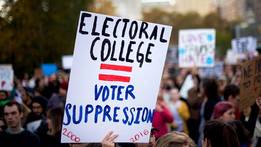 Jessica Dorcelien Editor-in-Chief President Donald J. Trump lost the popular vote to Hillary Clinton by almost 2.9 million votes. Since the publicity of these voting discrepancies, Trump has claimed that a whopping three to five millions voters had voted illegally in the 2016 presidential election. This new allegation, according to major news source CNN, is said to have no statistical backing and has the potential to “erode the President’s credibility.” The Constitution includes the establishment of the Electoral College, a process for electing the next President and Vice-President of the United States. Considered a compromise between a vote in Congress and a popular vote of qualified citizens, the Electoral College consists of 538 electors. A majority of 270 electoral votes grants America its next President and Vice-President. But we, as American citizens, do not vote directly for the President; rather, we vote for a group of electors who pledge to vote for our candidate. Our Founding Fathers thought that a direct vote would be “too chaotic and prone to error.” Yet, a major recurring problem with the process is that the candidate who wins the presidency does not necessarily win the popular vote, meaning they may not have majority of Americans voting in their favor, as in the cases of our 19th, 23rd, 43rd, and now our 45th president, Donald J. Trump. According to many public news sources and officials, “Trump is [still] on a quest to prove his legitimacy.” Comments are closed.
|
Archives
March 2017
Categories
All
|

